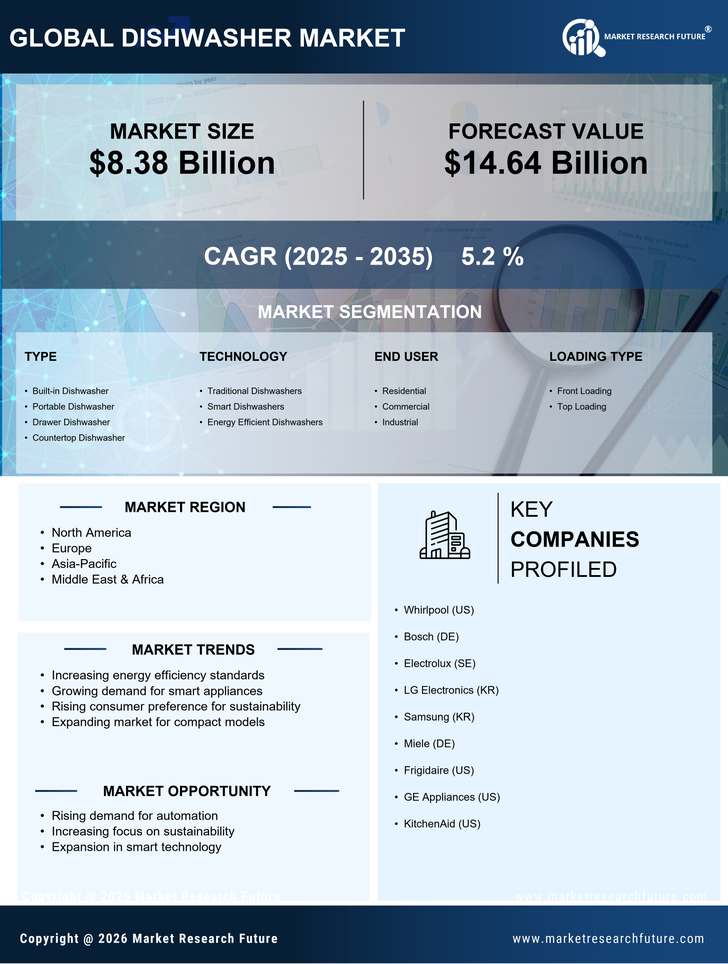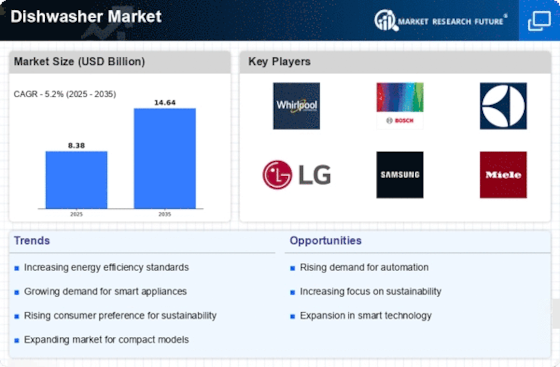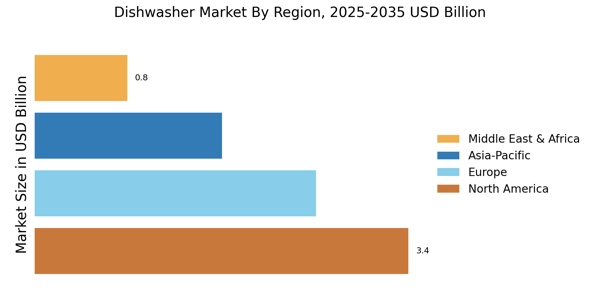Increased Focus on Sustainability
The dishwasher Market is witnessing a heightened focus on sustainability, as consumers become more environmentally aware. This trend is evident in the rising demand for energy-efficient and water-saving dishwashers. Manufacturers are responding by developing products that not only meet performance standards but also adhere to eco-friendly practices. Recent statistics suggest that a considerable percentage of consumers prioritize sustainability when making purchasing decisions, leading to a surge in sales of eco-friendly models. Additionally, regulatory frameworks promoting energy efficiency are influencing market dynamics, encouraging manufacturers to innovate in this direction. The emphasis on sustainability is likely to shape the future of the Dishwasher Market, as consumers increasingly seek products that align with their values.
Rising Consumer Demand for Convenience
The Dishwasher Market experiences a notable increase in consumer demand for convenience-driven appliances. As lifestyles become busier, consumers seek solutions that save time and effort in household chores. This trend is reflected in the growing sales of dishwashers, which have seen a steady rise in adoption rates. According to recent data, the penetration of dishwashers in households has increased significantly, with estimates suggesting that over 70% of households in developed regions now own a dishwasher. This shift indicates a strong preference for automated solutions, driving manufacturers to innovate and enhance their product offerings. The Dishwasher Market is thus positioned to benefit from this trend, as consumers prioritize convenience and efficiency in their daily routines.
Growing Urbanization and Population Density
Urbanization and increasing population density are significant drivers of the Dishwasher Market. As more people move to urban areas, the demand for efficient home appliances rises. In densely populated regions, where space is often limited, dishwashers offer a practical solution for managing household tasks. The trend towards smaller living spaces has led to a preference for compact and multifunctional appliances, including dishwashers. Market data indicates that urban households are more likely to invest in dishwashers, as they seek to optimize their living environments. This demographic shift is expected to continue influencing the Dishwasher Market, as urbanization trends persist and consumers look for convenience in their daily lives.
Technological Advancements in Appliance Design
Technological advancements play a crucial role in shaping the Dishwasher Market. Innovations such as energy-efficient models, smart connectivity features, and advanced cleaning technologies are increasingly appealing to consumers. The integration of IoT (Internet of Things) capabilities allows users to control and monitor their dishwashers remotely, enhancing user experience and convenience. Furthermore, energy-efficient dishwashers are gaining traction, as consumers become more environmentally conscious and seek to reduce their energy consumption. Data indicates that energy-efficient models account for a significant portion of sales, reflecting a shift towards sustainable appliance choices. As technology continues to evolve, the Dishwasher Market is likely to witness further growth driven by these advancements.
Evolving Consumer Preferences and Lifestyle Changes
The Dishwasher Market is significantly influenced by evolving consumer preferences and lifestyle changes. As consumers become more health-conscious and prioritize cleanliness, the demand for dishwashers that ensure hygienic cleaning has increased. Additionally, the rise of home cooking and meal preparation has led to a greater need for efficient dishwashing solutions. Industry expert's indicates that consumers are increasingly looking for dishwashers that offer advanced cleaning technologies and customizable settings to accommodate various types of cookware. This shift in consumer behavior is prompting manufacturers to innovate and diversify their product lines, catering to the specific needs of modern households. The Dishwasher Market is thus adapting to these changes, positioning itself for sustained growth.


















